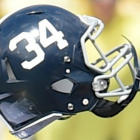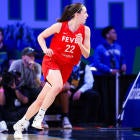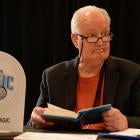Georgia Southern cheated academically and it still didn't help as intended.
There was an amusing part of the NCAA infractions report Thursday that placed Georgia Southern's football program on two years' probation. According to the NCAA, one violation occurred when the school's former assistant director of student-athlete services did extra-credit work for two football players, yet they still didn't pass the class. From the NCAA report:
"As the semester progressed, neither student-athlete appeared to be in a position to pass the course. Therefore, and unbeknownst to the student-athletes, the former assistant director of student-athlete services drafted and submitted five extra credit assignments on behalf of each student-athlete. Specifically, from November and December 2014, she obtained the student-athletes' login and password information, drafted and submitted extra credit assignments. Based on their previous academic work, however, the assignments did not result in a passing grade for either student-athlete."
In another bold act, the NCAA said a former Georgia Southern assistant compliance director gave a football player a flash drive containing coursework from a class she previously took. The player used the flash drive to submit the coursework as his own.
The violations occurred in the 2013-14 and 2014-15 academic years. The NCAA ordered Georgia Southern to vacate any wins that occurred while the players were academically ineligible, though it's not clear yet which wins will be removed. As an FCS school in 2013, Georgia Southern upset Florida on the road. A year later, Georgia Southern transitioned to the FBS and won the Sun Belt championship.
Georgia Southern's football team will lose two scholarships over the next four years and 10 percent of its official visits and recruiting violations. The school will be fined $5,000 plus 1 percent of its football budget ($43,000).
The NCAA report also showed how the association's enforcement staff and infractions committee are wrestling with the NCAA's narrower interpretation of academic misconduct violations. In April 2014, the NCAA provided an interpretation letting schools determine whether academic misconduct occurred based on their own policies. The first NCAA standard for whether academic misconduct occurred is when a university staff member is involved in arranging for fraudulent academic credit or false transcripts.
In the Georgia Southern case, the NCAA determined the staff members provided "impermissible academic assistance" rather than having committed "academic misconduct." Because the former assistant compliance director who provided the flash drive to the football player was not helpful in the investigation, the NCAA said it did not know her intent and didn't charge academic misconduct. Different charges were leveled instead that the school agreed upon.
Regarding the extra credit work for players, Georgia Southern did not determine that the conduct violated its academic dishonesty policy. That's because the professor of the class didn't pursue academic dishonesty charges since the players were unaware of the extra credit done on their behalf, according to the NCAA. Charges other than academic misconduct were applied in that instance, too.
Whatever you want to call it, Georgia Southern's idea of extra credit struck out getting two players a passing grade.

















